Years ago when I first read the phrase “promoting normal birth” I was confused. Why would a healthcare professional be promoting any set of procedures or any particular approach to a health issue? I thought it was the job of health professionals to promote safety.
It is unethical for a medical professional to promotes one procedure over another when both are equally effective in dealing with the issue at hand. An ethical medical professional recommends whatever is safest for the patient, not whatever is most pleasing to or most lucrative for him or herself. There are no real medical publications claiming to promote one form of treatment or even one philosophy over another. Real medical publications promote health and promote safety, not the opportunity to confirm one’s prejudices or line one’s pockets.
In contrast, many midwives unabashedly promote one form of birth over another, ineffective pain relief measures over effective pain relief, and rejecting technology in favor of “unhindered” birth. Indeed, the entire midwifery corp of the UK is strictly committed to unmedicated vaginal birth, going to far as developing and maintaining the Royal College of Midwives “Campaign for Normal Birth.”
So I have a question for natural childbirth advocates, midwives and other birth workers: isn’t that unethical? Or more to the point: how can it possibly be ethical to promote one way of giving birth over any other?
Furthermore, aren’t attempts to promote unmedicated vaginal birth an abuse of midwives’ power over patients? Shouldn’t they be providing accurate, value-free medical information to patients and then honoring whatever decisions patients make? How can they justify promoting their own beliefs about birth over their patients desires?
I ask these questions because I’m anxious to see whether any natural childbirth advocates are willing to grapple with the ethical implications of their efforts to promote unhindered, unmedicated vaginal birth. I suspect that no one will.


